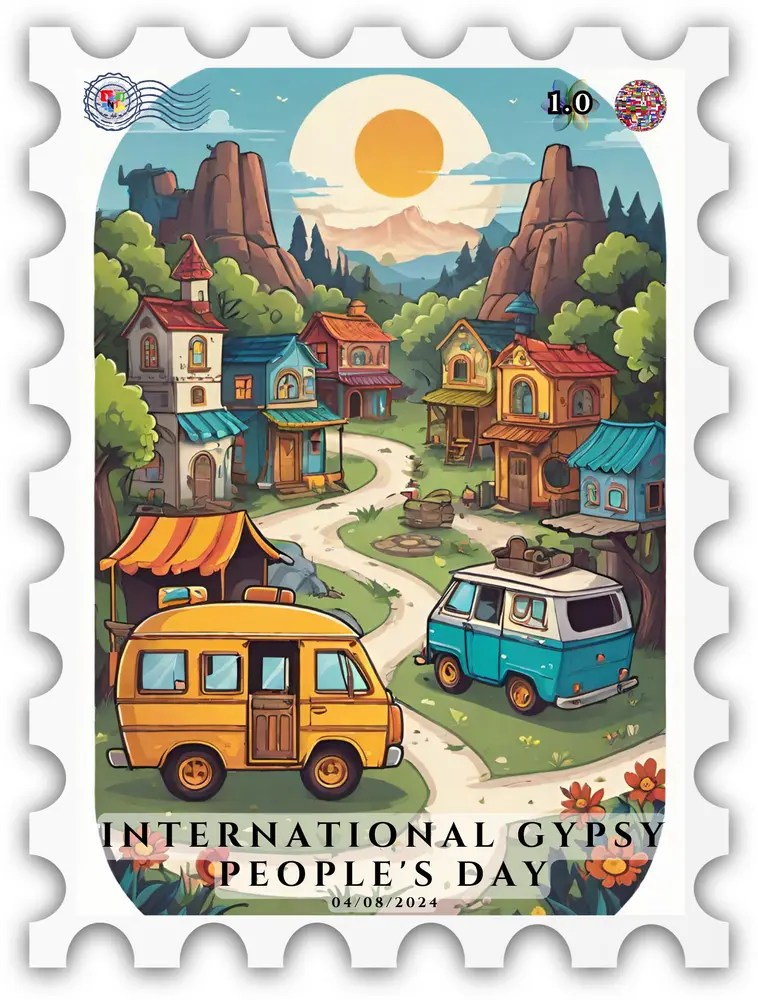A proposal that invites you to collaborate long-term with the @PSYCOart project, whose idea is to provide designs that match your personality through geometric patterns, colors and styles. Today in its exhibition Collection "Knowing You" SERIES 12-C of 86, it gives rise, in addition to making a logo, pattern or gif for the purpose you want to give it. And to ensure yourself for the future, obtain the CC $PSYCOart, beyond when it becomes 100% FR. Keep in mind that CCs from third parties are also distributed with it, as well as, even if you are not able to acquire this NFT, you can obtain a royalty in the mint that will accompany it.
nftz.me/nft/849cc8e84cb1aa61bac7a4a099e68cf3dd786f6c7f48e96b25f0ea88894c5232
International Gypsy People's Day is celebrated on April 8 with the aim of recognizing the value of the Gypsy people and the contributions that their culture and history have made to the world.
They want to end once and for all the stigma and discrimination to which they have been subjected for so long.
History of the gypsy people
The true origin of the gypsy people is still not known. What is known is that their breed is very ancient, which gives it an aura of mystery and fascination today.
It is believed that their origin is legendary, but the gypsy people represent a vast and rich culture that goes beyond the clichés and myths that have been attributed to them over time of being bohemian and wandering people, who travel the world. Quite the contrary, gypsies have managed to gain a space, thanks to their work and important contribution to society.
The history and culture of the gypsy community has always been integrated into Spanish territory, but it has its original roots in India and over the years they have been able to develop thanks to contact with other peoples and cultures that, without a doubt, they make citizens of the world.
Films and documentaries about gypsy culture
Gadjo Dilo (1997. Country: France / Romania. Director: Tony Gatlif): This film tells the story of a young Frenchman who travels to Romania in search of gypsy music and finds a gypsy community that welcomes him.
Latcho Drom (1993. Country: France. Director: Tony Gatlif): This documentary chronicles the migration of Gypsies from India to Europe, introducing their music and culture along the way.
Korkoro (2009. Country: France. Director: Tony Gatlif): This film tells the story of a gypsy family in Nazi-occupied France during World War II.
Carmen y Lola (2018. Country: Spain. Director: Arantxa Echevarría): Spanish film that tells the story of two gypsy women who fall in love and must face the rejection of their conservative community.
Los Tarantos (1963. Country: Spain. Director: Francisco Rovira Beleta): film about the story of two gypsy families who fight to overcome the rivalry between them and to keep their tradition of flamenco dancing alive.
Vengo (2000. Country: Spain / France. Director: Tony Gatlif): film that tells the story of a gypsy family in Andalusia that faces violence and grief after the death of one of its members.
Latcho Drom: The Gypsy Route (1993. Country: France. Director: Tony Gatlif): documentary that includes interviews and more details about Gypsy history and culture.
Gypsies here and now (2016. Country: Spain. Director: Joaquín Llamas): documentary produced by RTVE (Spanish Radio Television) that addresses the current life of the Gypsy people in Spain. The documentary features testimonies from experts and leaders of the Roma community, as well as Roma people who share their life experiences and dreams. The intention of the documentary is to make known the reality of the Gypsy community in Spain and promote understanding and respect for their culture.
If you want to collaborate with the cause of the Roma people, we invite you to celebrate this day by sharing on different social networks a message, image or video allegorical to this topic through the hashtag #InternationalGypsyPeopleDay, #gypsies #gypsypeople.
